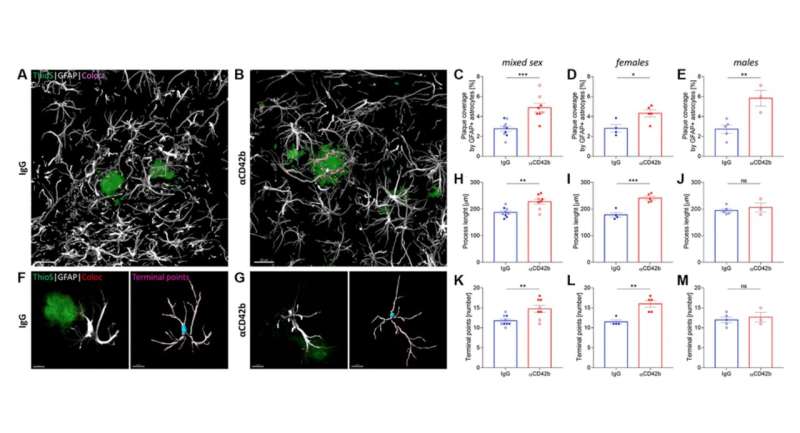This article has been reviewed according to Science X's editorial process and policies. Editors have highlighted the following attributes while ensuring the content's credibility:
fact-checked
proofread
Immune-mediated platelet depletion augments Alzheimer's disease in mice: Study

A new research paper titled "Immune-mediated platelet depletion augments Alzheimer's disease neuropathological hallmarks in APP-PS1 mice" has been published in the journal Aging.
In Alzheimer's disease (AD), platelets become dysfunctional and could contribute to amyloid beta deposition. In a recent study, researchers from Paracelsus Medical University and the Austrian Cluster for Tissue Regeneration in Austria depleted platelets in one-year-old APP Swedish PS1 dE9 (APP-PS1) transgenic mice for five days, using intraperitoneal injections of an anti-CD42b antibody, and assessed changes in cerebral amyloidosis, plaque-associated neuritic dystrophy and gliosis.
The researchers explain, "The potential role of platelets in amyloid beta deposition led to the hypothesis that reducing platelet numbers might ameliorate AD pathology [30]. Here, we performed immune-mediated platelet depletion in APP-PS1 mice with an already fully developed amyloidosis and investigated its effects on classical hallmarks of AD: amyloid plaque pathology, plaque-associated neuritic dystrophy and gliosis."
In APP-PS1 female mice, platelet depletion shifted amyloid plaque size distribution towards bigger plaques and increased neuritic dystrophy in the hippocampus. In platelet-depleted females, plaque-associated Iba1+ microglia had lower amounts of fibrillar amyloid beta cargo and GFAP+ astrocytic processes showed a higher overlap with thioflavin S+ amyloid plaques.
In contrast to the popular hypothesis that platelets foster plaque pathology, data from this study suggest that platelets might limit plaque growth and attenuate plaque-related neuritic dystrophy at advanced stages of amyloid plaque pathology in APP-PS1 female mice. Whether the changes in amyloid plaque pathology are due to a direct effect on amyloid beta deposition or are a consequence of altered glial function must be further elucidated.
"In APP-PS1 females, acute thrombocytopenia aggravates AD neuropathology, suggesting that platelets might have a protective function in AD. However, the underlying molecular mechanisms by which platelets modulate amyloid plaque deposition remain elusive and need to be investigated in future experiments," the researchers conclude.
More information: Diana M. Bessa de Sousa et al, Immune-mediated platelet depletion augments Alzheimer's disease neuropathological hallmarks in APP-PS1 mice, Aging (2023). DOI: 10.18632/aging.204502



















